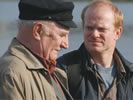Eye For Film >> Movies >> Of Parents And Children (2008) Film Review
Sometimes the best way to get to know a city is just to take a long walk around it. This principle, the very bedrock of Patrick Keiller's London (1994), also underlies Vladimír Michálek's genetic comedy Of Parents and Children, based on the prize-winning 2002 novel by Emil Hakl.
Once every three weeks, retired biologist Ivan (Josef Somr, the station guard from Closely Observed Trains) and his 40-year-old son Johnny (David Novotný) meet and spend the day together on a walking tour of Prague (with regular stops for beer), swapping stories about medical ailments, food, women, botany, mortality and their complicated family history, not to mention more outrageous anecdotes about illicit sexual encounters, cannibalism and matricidal fantasy.

Meanwhile another child, Johnny's own 22-year-old illegitimate son Robert (Luboš Kostelný), pays an unexpected visit to Johnny's younger girlfriend Marta (Mariana Kroftová), who has not yet been informed of her partner's recently discovered parenthood. In what follows, the dumb mistakes and petty betrayals of the past look set to repeat themselves to the bittersweet end.
Near the end of Michálek's film, in response to the seemingly innocuous question: "What's new?", Ivan exclaims: "For God's sake, there hasn't been anything new for the last two billion years!" He is, after all, a doctor of science, and this Darwinian perspective on social relations and human achievement is well illustrated by the film's free-associative series of flashbacks, whose recombinant themes play off one another to suggest nothing ever changes in Ivan's extended family line, despite the desperate efforts of each generation to break away from the errors of its predecessor. Here, like the missing orangutan in a story told by Ivan early in the film, or indeed like the long-lost Robert, the past, too, disappears only to reappear when you least expect it.
Of Parents And Children brims with charming performances and nuanced observations, but these alone are not enough to prevent it from seeming to last an epoch, with little to show in terms of its own natural evolution. Pacing itself by uneconomic repetitions and unnecessary diversions, the film limps along its meandering path as slowly and unsteadily as the debilitated patriarch – and while this long, long trip down memory lane might culminate in worldweary resignation for the protagonist, many viewers will simply feel bored, and somewhat relieved finally to be at the end of the road. As for Prague, if one senses she is supposed to be a principal character (as she was in Hakl's original novel), in adaptation she has become little more than a background extra.
Reviewed on: 04 Oct 2008
















